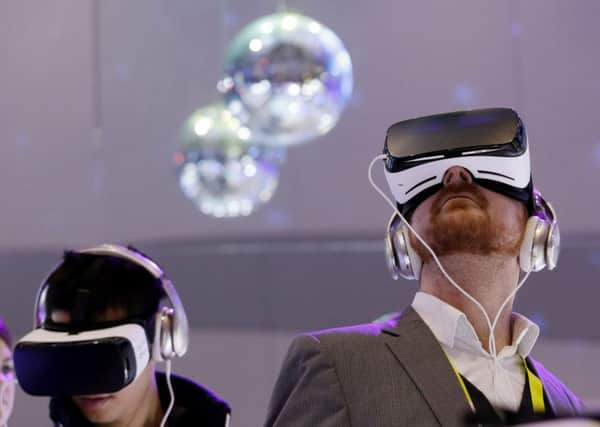Will 2016 become the year of virtual reality?
This article contains affiliate links. We may earn a small commission on items purchased through this article, but that does not affect our editorial judgement.


More than three decades have passed since William Gibson’s novel Neuromancer helped propel the concept of VR into the public consciousness, while the later Lawnmower Man movie presented an even more dystopian vision of the future.
Since then, various attempts have been made to bring VR into our homes, from Nintendo’s headache-inducing Virtual Boy to Google’s fold-out Cardboard viewer and the rather more advanced Oculus Rift, which began shipping in April.
Advertisement
Hide AdAdvertisement
Hide AdSocial networking giant Facebook, which acquired Oculus for $2 billion (£1.3bn) in 2014, recently made further inroads into sector by snapping up Edinburgh-based Two Big Ears, which specialises in VR audio. The deal, for an undisclosed sum, will see the start-up make its software tools available to video developers for free as it seeks to scale up its technology and “continue powering immersive audio experiences”.
Two Big Ears chief executive Abesh Thakur, who co-founded the firm in 2013 with fellow University of Edinburgh graduate Varun Nair, said at the time: “Our mission is to make VR audio succeed across all devices and platforms and continue to help creators make the best experiences for billions of people across the world.”
And now even brewers and travel agents are seeking to cash in on the ability of VR to transport users to faraway lands.
Edinburgh-based Innis & Gunn has teamed up with cognitive neuroscientist Dr Jacob Jolij to create content that it claims will change the way beer tastes by triggering the brain to send new signals to the tastebuds. Meanwhile, Barrhead Travel will be introducing VR headsets into its stores to allow customers to view hotel rooms and “destination experiences” before they book their holidays.
Bonamy Grimes, co-founder of Edinburgh-based travel search engine Skyscanner, says European firms are in a “strong position” to cultivate these new technologies.
“Virtual reality will require a combination of creativity and technology. With some of the best universities in the world, we have the talent to take up this opportunity and you are already seeing European competitors in the sector on the rise.”
He adds: “I think the rise of artificially intelligent technologies will bring the next wave of change in the travel sector. You used to go into a travel agent to have a discussion with the ‘expert’ and that conversation was clearly a human process of learning and refinement.
“The loss of this type of personal interaction has left an information gap that an entrepreneur could tackle with an artificially intelligent platform. You could even say the same of virtual reality.”
Advertisement
Hide AdAdvertisement
Hide AdWith Samsung’s Gear VR and HTC’s Vive also vying for attention, the VR market is suddenly looking rather crowded, but observers believe that Sony’s offering – due to go on sale in October with a price tag of £349 – stands a strong chance of succeeding. More than 40 million PlayStation consoles – which will be needed, along with a separate camera, to use the headset – have already been sold around the world since launching in November 2013.
Market researcher Park Associates says that VR and cloud-based gaming services, which can be played on a range of streaming media devices, are “pushing the gaming industry into a new stage” as its data shows a “steady decline” in the take-up of gaming consoles across many European markets, including the UK.
And Goldman Sachs predicts that the annual market for VR hardware sales alone could be worth up to $110bn by 2025. Add in the potential for a further $72bn of software revenues, and the market could become almost twice as big as that for television.
In its report, the investment bank says: “Looking back at the history of computer interface evolution, from command line, Windows, to the latest touch interface, the addressable market was broadened as the user interface became more intuitive. Twenty-five years ago, one would need to be properly trained to use a computer with command line or programming codes, but now one can use a smartphone/tablet without any training at all.
“In the world of virtual/augmented reality (AR), the controls of the computer become what we are already familiar with through gestures and graphics. VR/AR also gives us wider field of view, where the concept of virtual desktop is no longer confined by the size of a physical display screen on our desktop or in the palm of our hands.”
It adds: “Given this attribute of ease of use and the multiple use cases across VR/AR, we see the potential for the technology to emerge from vertical specific use cases to a broader computing platform.”
